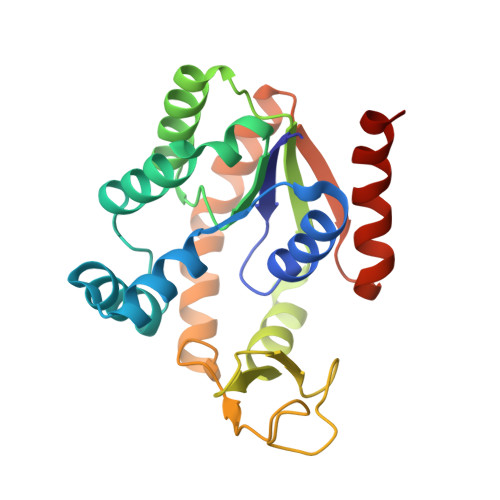An integrated approach for thermal stabilization of a mesophilic adenylate kinase.
Moon, S., Jung, D.K., Phillips Jr., G.N., Bae, E.(2014) Proteins 82: 1947-1959
- PubMed: 24615904
- DOI: https://doi.org/10.1002/prot.24549
- Primary Citation of Related Structures:
4MKF, 4MKG, 4MKH - PubMed Abstract:
Thermally stable proteins are desirable for research and industrial purposes, but redesigning proteins for higher thermal stability can be challenging. A number of different techniques have been used to improve the thermal stability of proteins, but the extents of stability enhancement were sometimes unpredictable and not significant. Here, we systematically tested the effects of multiple stabilization techniques including a bioinformatic method and structure-guided mutagenesis on a single protein, thereby providing an integrated approach to protein thermal stabilization. Using a mesophilic adenylate kinase (AK) as a model, we identified stabilizing mutations based on various stabilization techniques, and generated a series of AK variants by introducing mutations both individually and collectively. The redesigned proteins displayed a range of increased thermal stabilities, the most stable of which was comparable to a naturally evolved thermophilic homologue with more than a 25° increase in its thermal denaturation midpoint. We also solved crystal structures of three representative variants including the most stable variant, to confirm the structural basis for their increased stabilities. These results provide a unique opportunity for systematically analyzing the effectiveness and additivity of various stabilization mechanisms, and they represent a useful approach for improving protein stability by integrating the reduction of local structural entropy and the optimization of global noncovalent interactions such as hydrophobic contact and ion pairs.
- Department of Agricultural Biotechnology, Seoul National University, Seoul, 151-921, Korea.
Organizational Affiliation:



















